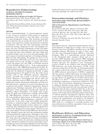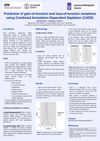 4 citations,
January 2022 in “The journal of investigative dermatology/Journal of investigative dermatology”
4 citations,
January 2022 in “The journal of investigative dermatology/Journal of investigative dermatology” A faulty KLHL24 gene leads to hair loss by damaging hair follicle stem cells.
11 citations,
September 2021 in “American Journal of Medical Genetics Part A” Four new cases of Bachmann-Bupp syndrome suggest potential for targeted treatment.
 April 2020 in “Journal of the Endocrine Society”
April 2020 in “Journal of the Endocrine Society” A woman's severe hirsutism was caused by Leydig cell tumors in her ovaries, which improved after surgery.
[object Object] 2 citations,
July 2022 in “Journal of the Endocrine Society” Some women with PCOS have rare genetic variants linked to the condition.
 489 citations,
November 2021 in “Signal Transduction and Targeted Therapy”
489 citations,
November 2021 in “Signal Transduction and Targeted Therapy” The JAK/STAT pathway is important in cell processes and disease, and JAK inhibitors are promising for treating related conditions.
 59 citations,
July 2015 in “Journal of Immunology”
59 citations,
July 2015 in “Journal of Immunology” Certain proteins, caspases-1 and -11, are important in the early development of skin inflammation in mice.
 86 citations,
August 2011 in “Toxicological sciences”
86 citations,
August 2011 in “Toxicological sciences” TCDD speeds up skin barrier formation by increasing certain gene expressions.
 47 citations,
January 2021 in “Fertility and Sterility”
47 citations,
January 2021 in “Fertility and Sterility” COVID-19 might affect male fertility, but more research is needed to understand the full impact.
 3 citations,
May 2023 in “Frontiers in immunology”
3 citations,
May 2023 in “Frontiers in immunology” Faulty inflammasome activation may lead to autoimmune skin diseases and could be a target for new treatments.
 2 citations,
December 2023 in “Journal of clinical immunology”
2 citations,
December 2023 in “Journal of clinical immunology” Ruxolitinib significantly improves multiple autoimmune conditions in APS-1 patients.
 359 citations,
September 2017 in “European Journal of Epidemiology”
359 citations,
September 2017 in “European Journal of Epidemiology” The Rotterdam Study updated findings on elderly health, focusing on heart disease, genetics, lifestyle effects, and disease understanding.
 140 citations,
January 2009 in “JEADV. Journal of the European Academy of Dermatology and Venereology/Journal of the European Academy of Dermatology and Venereology”
140 citations,
January 2009 in “JEADV. Journal of the European Academy of Dermatology and Venereology/Journal of the European Academy of Dermatology and Venereology” Liposomes improve drug delivery and reduce skin irritation in dermatology.
 58 citations,
December 2020 in “Mayo Clinic Proceedings”
58 citations,
December 2020 in “Mayo Clinic Proceedings” The conclusion is that individual differences in COVID-19 severity are influenced by factors like age, sex, race, and genetics, which are important for personalized medicine.
 September 2004 in “Experimental dermatology”
September 2004 in “Experimental dermatology” Melatonin directly affects mouse hair follicles and may influence hair growth.
 59 citations,
June 2022 in “Frontiers in medicine”
59 citations,
June 2022 in “Frontiers in medicine” There are still challenges in diagnosing and treating chronic skin diseases, but there is hope for future improvements.
9 citations,
June 2023 in “Cells” Certain natural and synthetic compounds may help treat inflammatory skin diseases by targeting a specific signaling pathway.
1 citations,
December 2023 in “Molecules/Molecules online/Molecules annual” JAK inhibitors show promise for treating various skin diseases.
 July 2023 in “Journal of Biomedical Science”
July 2023 in “Journal of Biomedical Science” Different people show different symptoms for genetic diseases because of how sensitive their bodies are to small changes in important factors.
23 citations,
February 2015 in “The American journal of pathology” Keratosis pilaris is often linked to genetic mutations and causes skin and hair abnormalities, regardless of those mutations.
88 citations,
August 2019 in “Frontiers in immunology” Tyrosine kinases are important in skin autoimmune diseases and could be targets for new treatments.
[object Object] 
A genetic mutation in the EDA gene causes hypohidrotic ectodermal dysplasia in cats.
4 citations,
January 1992 in “American Journal of Ophthalmology”  25 citations,
December 2018 in “Human Molecular Genetics”
25 citations,
December 2018 in “Human Molecular Genetics” The document concludes that certain mutations may contribute to the inflammation in hidradenitis suppurativa and suggests that targeting TNFα could be a treatment strategy.
 10 citations,
March 2019 in “Human Genetics”
10 citations,
March 2019 in “Human Genetics” A genetic mutation in the SGK3 gene causes hairlessness in Scottish Deerhounds and may relate to human hair loss.
 October 2023 in “Psychiatry research. Case reports”
October 2023 in “Psychiatry research. Case reports” A new HRAS gene variant may cause a range of symptoms including intellectual disability and psychiatric issues.
 December 2023 in “JCEM case reports”
December 2023 in “JCEM case reports” A new gene variant causes glucocorticoid resistance in a mother and son.
 36 citations,
March 2019 in “European Journal of Human Genetics”
36 citations,
March 2019 in “European Journal of Human Genetics” The research found genetic differences in identical twins that could explain why one twin has a disease while the other does not.
 1 citations,
January 2023 in “International Journal of Molecular Sciences”
1 citations,
January 2023 in “International Journal of Molecular Sciences” Understanding how Regulatory T Cells work could help create treatments for certain skin diseases and cancers.
28 citations,
November 2018 in “American Journal of Medical Genetics Part A” ODC1 gene mutations cause a neurodevelopmental disorder with large head size, hair loss, and facial abnormalities.
 1 citations,
September 2017
1 citations,
September 2017 C-scores can help predict gain-of-function and loss-of-function mutations.






















